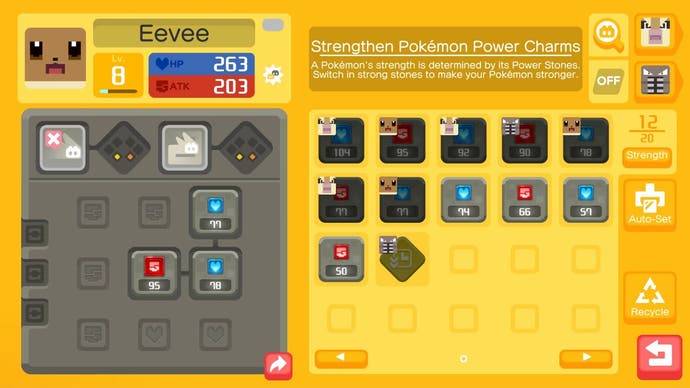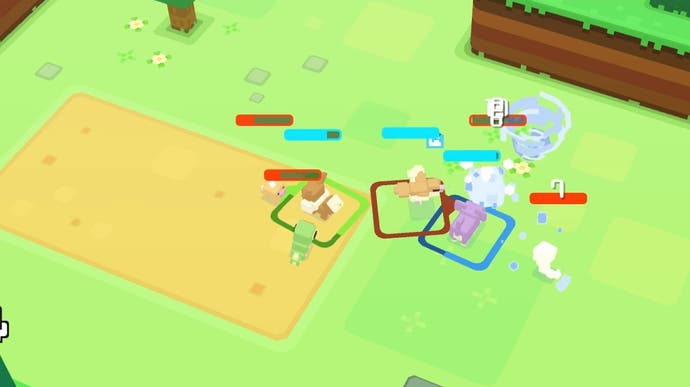For its first few hours Pokémon Quest is a passive sort of fun
But when will it drop the hammer?
I am the absentee parent to a bunch of Poké-bullies. The only phrase for what these guys are doing - and it is a phrase I have had to dredge from ancient childhood - is duffing people up. They're at it right now, Poké-villains, Poké-jerks. As I type this, they're kicking in a Weepinbell. It is almost a relief when I run out of battery.
Listen: if they run into a Psyduck, I'm going to pull the plug. But as for the moment I'm quite enjoying things. So far, Pokémon Quest is a charming, if devious, bit of flim-flam. Two hours into this "free-to-start" game, I haven't handed over any money, either. But I sense the moment when the hammer drops is coming.
Is it going to be worth paying up? I'm not sure yet. Pokémon Quest is a sort of automated Diablo. You're exploring a lovely island in which everything around you is candy-coloured and made of chunky little cubes. Your Pokémon are made of chunky little cubes too, and once you pick a starter - Pikachu looks rather like a housecat rendered in this art style - you head off on expeditions, which are basically two- or three-minute chunks of Pokémon harassment in which your Pokémon savage other Pokémon.
Very quickly you have a full load-out of three Pokémon to gang about with, and it's pretty nice simple fun: the Pokémon move by themselves, encountering packs of enemies and eventually a boss, but you can handle their attacks and manage the cool-downs. Or you can automate that too and just revel in the loot that comes in - cooking ingredients and power stones, which are gems that fit into sockets that are gradually unlocked in each Pokémon as they level. One might give a boost to critical hits or raise HP, another might provide a speedier cooldown for an attack.
This is where the game's true heart lies, I think: in meddling with the socketed innards of each Pokémon, finding the best stones and levelling a right old collection of Pokémon so that you can tailor your team for the territory ahead. After two hours I have set attacking to auto to go along with movement, so this is the part of the game that I'm actually playing, and it's pretty fun. I like to see the numbers go up.
I like to see the numbers of Pokémon go up, too, and that particular matter is taken care of back at base camp, where you spend time between expeditions. New Pokémon are lured to you by the dishes you make with the ingredients. You chuck a bunch of stuff into the pot - you can set this to auto-select too - and after a set number of expeditions you've cooked something that has lured a stray Pokémon into your fold. Man, I was just minding my own business, and then I stewed my way to a Ponyta with a really high starting level. They went right into my line-up, I can tell you. To my shame, I even sacrificed a few of my less lovable Pokémon to train that Pokémon to even higher stats. I felt bad about it though, at least. (I did not feel bad about it.)
That's the basic fun, I think, and the rest is just the complications that come from this kind of thing. Expeditions all have a certain power level displayed, and it's worth getting your team of three Pokémon up to that power level in order to tackle them. This isn't too much of a problem so far - I'm into the third area of the map at the moment - as you can grind old areas to level up and rake in power stones that will boost your Pokémon as you experiment with them. The more you grind, though, the more the battery system kicks in. The battery has five units, one of which is depleted each time you go on an expedition. The first time I ran completely dry I faced a 30-minute cooldown for the first battery unit to recharge. By this point, though, I had been keeping the battery topped up with various battery boosts I had earned through a missions system, which rewards you for doing basic things in the game, a la most other free-to-play titles out there.

If I didn't want to wait, I could spend some PM Tickets, of course. These tickets are the main currency driving Pokémon Quest's economy. You get a fresh bunch every 22 hours, and you also get them fairly regularly in-game for rewards and what-have-you. You can use them in all the ways you might expect: to recharge your battery, to buy items at the Poké Mart, to speed up the cooking process so you can increase your roster of Pokémon. You can also use them to keep items from any expeditions you fail to complete.
Interestingly, you can't flat-out buy PM Tickets with real money. Or rather, it isn't that straightforward. Instead, you spend real money on expedition packs, which scale from £4.49 to £16.19. (There's also a three-pack bundle for £26.99.) These packs contain all kinds of in-game stuff that you might want - including exclusive decorations, which are items that improve your chances of attracting more Pokemon, receiving ingredients and other things - but they also boost the number of PM Tickets you receive every 22 hours - and they come with some bonus PM Tickets to boot.
Elsewhere, outside of standalone Power Stones for £2.69, the rest of the Poké Mart runs on PM Tickets.
So where is the hammer likely to fall? So far, the bottlenecks that loom most closely come down to the battery and inventory space. This last one is evil genius, frankly. You start the game with the capacity to carry 20 Pokémon and 20 items. Each time you want to boost that capacity by another 20 - all the way to 300 of each - you need to spend 50 PM Tickets.
There are, of course, all of the intricacies you expect from Pokémon games: the types of Pokémon come into play in terms of the areas that you're exploring, there are already long-range and short-range Pokémon to take into account, and then there's all the fun of levelling them and getting new skills into play. The more time that passes, however, the more Pokémon Quest has become something I listen to, grinding on with everything set to auto while I send emails or look out of the window and think about root beer. Two hours in and I don't want to stop playing, but this is by design a cheerfully passive sort of playing: I sit back, an absentee parent, while my Pokémon run wild.


